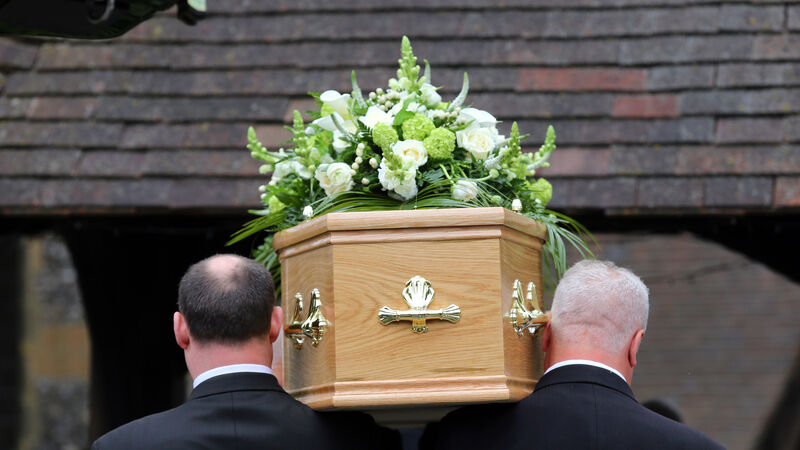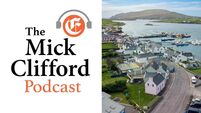Special Report: Grieving for a comforting way of life in death

While removals, wakes and refreshments have all stopped, Irish people did different things to pay their respects during the pandemic. File image
Standing around in a churchyard and going for soup and sandwiches after a funeral is part of a centuries-old tradition, but we have had to adapt to different grieving measures due to Covid-19, writes .
AT THE height of the global pandemic, just 10 mourners were allowed per funeral. When restrictions were eased that number only increased to 25.
Wakes did not happen. There was no gathering in churchyards to shake the hands of the bereaved and no soup and sandwiches in the local pub afterwards to share stories about the life of the deceased.
This curtailment of our oldest and most celebrated ritual has meant that people have not been able to grieve their loved ones nor be consoled by the sympathies of others, as they normally would have been.
Donal Forde has been burying people for 35 years but, in 2020, funerals as he knew them changed.
Director of Forde Funeral Homes in Cork and president of the Irish Association Of Funeral Directors, he says the thing that people miss most is “contact”.
“They [the public] miss the physical contact of being able to shake hands and hug. There were people who would have always expected big crowds at their funeral and that didn’t happen.
“The general public miss being able to go to funerals. People like to offer their support — just being there and shaking hands can mean so much,” says Donal.
When it was down to 10 mourners only, families found that restriction particularly hard but, with 25, most families could just about manage.
While removals, wakes and refreshments have all stopped, Irish people did different things to pay their respects during the pandemic.
“At the rural funerals, you’d have people on every corner, from the house to church and from the church to cemetery, paying their respects. And in the city, it’s gathering outside the house,” explains Donal.
However, what has had the biggest effect on people, in his observation, is families being unable to be with their loved ones as they die.
“The biggest thing we’ve noticed with families is the not being able to enter into nursing homes and hospitals and the just getting in on last few days. That’s had a big effect on people. Or only one family member has been allowed in,” he states.
One organisation that flagged the possible side effects of grieving in exceptional times was the Irish Hospice Foundation (IHF).
Orla Keegan is the head of education and bereavement services at the IHF. At the height of the pandemic, the IHF decided to set up a bereavement helpline for people experiencing the death of someone they loved because of Covid-19 or a death from other causes.
Remember, you are not alone in grief. Our @IrishHospice Bereavement Support Line is there for those grieving in these exceptional times. If you need to talk, please call. freephone 1800 80 70 77. In partnership with @HSELive #careingrief #COVID19ireland pic.twitter.com/S5G4OSHqvf
— Irish Hospice Foundation (@IrishHospice) December 14, 2020
They realised that people may also be finding a previous bereavement more difficult at this time.
While so much was “unknown” in March 2020, the helpline was set up and modelled on the “notion of psychological first aid or bereavement first aid”, says Orla.
People of all age groups ring the helpline, from adult children to friends and people in their 20s right up to their 90s.
As head of education, Orla says that the foundation is very clear to “never minimise a loss”.
People say: ‘Oh, you get used to loss as you get older’, but that is a myth,” she says.
Orla says that the wake, removal and funeral all serve functions for human beings and each of those have been “disrupted” this year.
“They help us come to terms with the reality of the death, that physical presence. The being there at the time of death helps with that, so too does the funeral. It also helps us feel our pain and have our pain witnessed by the community and, in viewing pain, people want to come towards us to commiserate. It’s part of the social contract.
“It’s showing us the person’s place in the community. You get to really define who that person was; you’re beginning that part of telling the story. You meet people you haven’t seen for years and they’re telling stories you’d never heard — it could be your father’s work colleague.
“So that got a bit disrupted, to put it frankly. People have to find different ways of doing it or they are feeling robbed or cut off from that,” says Orla.
The Christian funeral is of “profound importance to Irish society, allowing a celebration of the life of the deceased,” says historian Dr Marion McGarry.
The rituals surrounding our funerals allowed the bereaved to mourn, grieve and, hopefully, recover in a healthy manner.
She says the purpose of rituals at an Irish funeral is twofold.
“It is a way for the community to mark the passing of one of their members and show sympathy to those who have lost their loved ones,” says Dr McGarry.
Going back hundreds of years, Irish people have had the wake, in various forms, and the sharing of refreshments afterwards.
“In older times, there were many rituals and practices around Irish wakes and funerals. People would ritually smoke clay pipes at wakes, professional mourners or ‘keeners’ were hired to cry over the dead and there were even ‘wake games’ played to keep mourners awake as they sat up with the corpse.
“These customs have fallen away and, while the Irish funeral is more sombre now than it was in older times, it differs little from the past where prayers were said, refreshments were provided, alcohol may have been served, and stories and occasional laughter were welcome,” she explains.
With Covid-19, neither the wake nor the sharing of food and drink were permitted.
“The wake — that allows time spent with the body — can help in the grieving process. The substantial funeral service and burial, with the time taken and numbers involved, are all curtailed. After the burial, time taken to share food with neighbours and friends is no longer allowable,” states Dr McGarry.
Proving the importance of funerals to Irish people is the fact that you don’t just attend funerals of people you know, “there is an unspoken rule that you attend funerals of those closely related to people you know too”.
Niall Lynch lost six people this year, including his mother, Ursula Lynch, 93.
She died at the height of lockdown which meant he was unable to see her in the weeks leading up to her death.
It also meant his wife and children had to wait in the car outside the church during his mother’s funeral mass.
Several days later his wife’s father would pass away too, still in lockdown, so it was now Niall who would be watching the funeral on his phone in the car outside the church.
“My mother had dementia, she was in a nursing home in Navan, she died April 6. Vascular dementia shuts down different functions, and her swallow function shut down, so she hadn't eaten solids in a week. This was the second or third time this happened in nine months, and at 93 you can't survive too many bouts like that.
“It was in lockdown and my sister was able to visit her through the window, but my mother couldn't really see her because she had limited eyesight. Then my sister was with her for the last hour, by her side. They called her and said: ‘You'd better get here’.

They met her at the front door of the nursing home, gowned her, and she was given 60 minutes with my mother. She couldn't touch her. They were being super careful,” says Niall.
Niall last saw his mother on March 13, the day after the first tranche of government restrictions were announced.
So when Ursula passed away on April 6, the full lockdown had been enforced and his family was left grappling with manoeuvring itself through different counties and Government restrictions.
Niall was stopped four times by gardaí on the way to his 93-year-old mother’s funeral.
“It was strange at first, you're trying to get your head around things and calculate this and that and where can we go, what are we allowed to do. The funeral home was open for max an hour, you had to stay your distance - all the usual stuff you now take for granted was granted.
“And we were travelling from Cavan to Meath, so we worried about that and being stopped by the guards. So I said: ‘I'll keep RIP up on my phone if guards stop us’, and they did. We were stopped four times and they saw us as a family dressed up,” explains Niall.
Niall was able to see his mother in the funeral home before her mass, and his children were too, so everyone was able to say their goodbyes.
“Just to be able to do that little thing,” says Niall.
As lockdown was so new and so little was known about the spread of the virus, extreme caution was taken, meaning that when Ursula’s coffin arrived at the church, the front door was not open.
“The undertaker had to rap the door and the priest opened the door and said it was locked because he had to make sure it was no one else and that's why he had it bolted. Only 10 of us were allowed in and I had to give the undertaker a list of those people and he showed it to priest who kept a record.
“The priest led us in and it was quite strange - this large open church with galleries upstairs it was like sitting in the Gaiety with 10 people and you could see the emptiness,” says Niall.
Ursula had six children, meaning there wasn’t room for sons and daughters-in-law, nor grandchildren.
One thing that Niall missed was the Navan tradition of neighbours and friends gathering for the “big old chat in the chapel yard”.
“You’d look forward to that, that was all gone. Now you’re reading comments on RIP and it was just ‘goodbye old neighbours’ and that was as close as you got to locals coming up to you in the chapel yard saying that your mother was an ‘auld native’ and that she was a ‘good one’. My mother would have loved that,” says Niall.
At the graveside, cousins gathered, but again everyone kept their physical distance and as soon as his mother Ursula was buried “there was nothing after that,” as everyone went their separate ways.
Ten days later, Niall’s father-in-law, Tom White, 88, died unexpectedly. He had been up and about walking at home, when he developed a chest infection.
He ended up in hospital but it was arranged that two of his family members could go on a rota and be with him for the last two days of his life.
“They all got to see him, and one of them got to be with him when he died,” explains Niall.
This funeral was a “rural affair” and “people lined the roadsides” as his coffin passed. Again, the 10-mourner rule applied as Tom died on April 15, however, there were far more than 10 in his family as he was survived by his wife Teresa, 10 children and 24 grandchildren.
“I remember the undertaker saying: ‘Between you and me I think I've let 11 in’,” says Niall.
At Tom’s graveside, with everyone dotted around with two metres apart, about 19 of his grandchildren joined together in song and sang as his coffin was lowered into the ground.

Niall would attend four more funerals, his aunt, a daughter of a very good friend of his and two first cousins, Declan Reilly, 60, of Swords, Co Dublin, and PJ Lynch, 74, of Clontarf and Artane, Co Dublin.
“We used to check in with each other all the time, we were the three from the three different families that always touched base with each other,” explains Niall.
Both of those funerals took place during the Level 5 restrictions.
Niall has seen both the good and bad in 2020.
“What we used to dissipate our grief with was company and chat and ritual and we've not been able to do that, but on the other hand, and it's strange to say it, but it has been a kind of a gift. We've been forced into a space we might not otherwise have allowed ourselves to have - to sit back and contemplate,” believes Niall.
The good and the bad aside, Covid-19 has taught him to express any love or gratitude he has for a person, before it’s too late.
“Too much loss and lack of memory and ‘biting of the holy cords atwain’ is going to affect us all for years. Who knows for the better or the worse? So I know that every phone call I make is a must. I don’t want to lose anyone else without saying ‘I love you, I’m grateful for knowing you, you made a difference’ in whatever way I can say it and without delay.
“Because all we have right now is now. We can only hope that [a life] lived well, will carry us through to some friendlier place. We may someday be grateful, even, for what changes Covid-19 wrought in us”.
Margaret Kelly lost her mother Mary O’Connor (née Duggan), 89, on October 6.
Mary, raised in Frankfield View on the Old Youghal Road, had been living on Capwell Road until her death.
However, Mary, who loved company and “out”, moved in with Margaret for the duration of lockdown.
“Mum lived on her own, but she lived with me and my husband and daughter for March and April, we had her for 12 weeks, it’s a blessing. I finished up work on Tuesday and collected her on the Tuesday evening.
“Her biggest thing was loneliness. She said to me: ‘If I don’t die of Covid I would have died of loneliness’.
“I live in Carrignavar, and we would drive down to the end of the road and she would walk that park every single day during lockdown, it was 350 steps but that was a huge deal to her.
“My husband and I would get up and have breakfast and take the dogs out. When we’d come home, she’d be sitting waiting with her coat on to go for that walk,” explains Margaret.
Unfortunately Mary took a fall on May 23, which resulted in a hip replacement. Mary was taken to hospital by army personnel and because she had been watching the news every night with Margaret and her family, she was well aware of what was ahead of her in terms of no visitors.

“So for just over two weeks we had no communication with mum. She had a mobile but never used it. But a friend of my daughter’s, who worked in the hospital, used to use her own mobile and let us speak to mum, I will be eternally grateful to her,” says Margaret.
Mary recovered from her hip operation and returned home to her own house.
However, in October, she fell ill.
“In October she wasn’t feeling well. My son used to take her out every single Friday for lunch. She loved out, if you were getting the car NCT-ed she’d go with you.
“She was ages opening the front door and this was unusual, when my son got in, she just collapsed into his arms. That was a Friday and she passed on the Tuesday, she was brought into the Mercy Hospital and I got a phone call to say there was no hope, she had pneumonia,” says Margaret.
The fact that it early October, meant that the country was neither in Level 5 restrictions, nor lockdown, so Margaret was able to be with her mother as she passed.
The hospital was also very quiet, so they had peace of mind when visiting Mary.
Margaret describes the experience of her mother’s passing as both “beautiful” and something she is extremely grateful for.
“I said: ‘Mam you need to go, don’t be hanging on for us’, and with that she mouthed: ‘I love you’ and she was gone. There was no drama. It was beautiful and we were with her,” says Margaret.
“My mum’s own mum died when she was six weeks old, and she always had one dream in life and that was to meet her own mother, and at nearly 90, it was still always at the back of her mind. The fact that she was finally going to meet her mum gave us great solace,” she adds.
For the funeral, only 25 people were allowed into the church, but something special happened after the mass, that eased the restrictions.
“When we came out of the church and passed mam’s house, all the neighbours were out. The older people are so respectful and they all had their hands clasped, it was all people could do,” says Margaret.
Although losing her mother during 2020 was “not ideal”, gratitude is one of her overriding feelings.
“It wasn’t ideal, but we are so grateful to the Mercy. We didn’t take being with her for granted, and it has to be said because there are so many people out there who didn’t have that,” says Margaret.
Mary O’Connor was predeceased by her beloved husband Finbarr of 48 years. She is survived by her children Donal, Norma and Margaret, and her four grandchildren Yvonne, Darren, Graham and Leanne.
However, we have been able to attend people’s funerals virtually. Does this not go some way to creating ritual around death?





